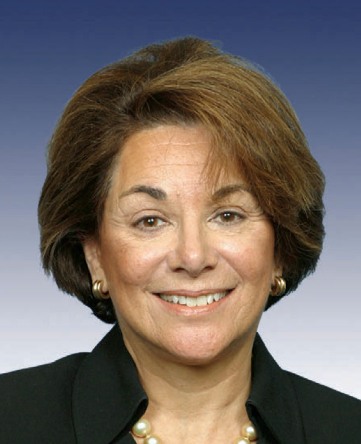Rep. Eshoo Proposes Retransmission Bill
The smarter way to stay on top of the multichannel video marketplace. Sign up below.
You are now subscribed
Your newsletter sign-up was successful

Rep. Anna Eshoo (D-Calif.) Monday released a draft of retransmission consent legislation in advance of a hearing this week dealing with that and other video regulation issues.
The bill, The Video CHOICE (Consumers Have Options in Choosing Entertainment) Act, "Gives the FCC explicit statutory authority to grant interim carriage of a television broadcast station during a retransmission consent negotiation impasse."
According to Eshoo the bill also:
- "Ensures that a consumer can purchase cable television service without subscribing to the broadcast stations electing retransmission consent.
- "Prohibits a television broadcast station engaged in a retransmission consent negotiations from making their owned or affiliated cable programming a condition for receiving broadcast programming.
- "Instructs the FCC to examine whether the blocking of a television broadcast station’s owned or affiliated online content during a retransmission consent negotiation constitutes a failure to negotiate in 'good faith.' ”
- "Calls for an FCC study of programming costs for regional and national sports networks in the top 20 regional sports markets."
Eshoo is the ranking member of the House Communications Subcommittee, which is holding a hearing Sept. 11 on video regulation that is expected to feature retrans and satellite licensing issues, tied to the 2014 expiration of the Satellite Television Extension and Localism Act (STELA).
Also expiring as part of that bill, unless Congress renews it, is the FCC's authority to enforce retransmission consent good faith negotiations.
Distributors -- cable and satellite operators -- have been pushing the FCC to use more muscle in enforcing good faith, including blocking blackouts and perhaps requiring third-party arbitration of impasses.
The bill comes as little surprise. Last month, during the recently resolved CBS/Time Warner Cable retransmission blackout, Eshoo, a long-standing retransmission blackout critic, signaled that she "intend[ed] to carefully examine whether changes to current law are needed to adequately protect consumers and prevent the reoccurrence of blackouts.”
The smarter way to stay on top of the multichannel video marketplace. Sign up below.
Broadcasters argue that blackouts are rare, and are part of a marketplace negotiation that should not include FCC intervention. Distributors point to must-carry, network non-duplication and syndicated exclusivity rules and say those are a government thumb on the scale that makes it far from a free-market negotiation.
Eshoo's action drew plaudits from the American Cable Association, the trade group representing small to mid-sized cable operators and an open advocate of changes to retransmission-consent regulations.
“ACA applauds Rep. Eshoo for having the vision and courage to offer a timely and thoughtful plan for addressing serious problems causing harm to consumers related to the broken retransmission consent and sports programming markets -- highlighted by a record-number of broadcaster signal blackouts and skyrocketing retrans fees that push up monthly pay-TV bills," ACA said in part. “To her great credit, Rep. Eshoo has proposed a set of common sense reforms. ACA agrees that the nation’s top media regulator – the Federal Communications Commission -- should have the authority to prevent TV signal blackouts as part of its mandate to protect the public interest, convenience and necessity. We also agree with Rep. Eshoo that consumers should not have to buy local TV stations that elect retransmission consent as part of their pay-TV package.”
“We applaud Ranking Member Eshoo for her leadership and her legislation to address the myriad problems with our retransmission consent system," said The American Television Alliance, whose members include the American Cable Association, Time Warner Cable, Dish and DirecTV. "Her voice is the latest in an ever-growing chorus calling for retrans reform and her bill is a step in the right direction. Consumers continue to be hit with more and more blackouts and we encourage Congress to consider reform immediately. We look forward to working with Ranking Member Eshoo and other members seeking to update our video rules into this century.”
Contributing editor John Eggerton has been an editor and/or writer on media regulation, legislation and policy for over four decades, including covering the FCC, FTC, Congress, the major media trade associations, and the federal courts. In addition to Multichannel News and Broadcasting + Cable, his work has appeared in Radio World, TV Technology, TV Fax, This Week in Consumer Electronics, Variety and the Encyclopedia Britannica.

